From Hobbyist to Seller – Starting a Side Business
Article - June 30, 2014
At what point do we cross the threshold into selling our work, and how can you be successful? I would be willing to wager that the idea of starting a business, or at bare minimum selling items on the side has crossed the mind of every hobbyist woodworker. I’m definitely guilty, and I’m currently in the process of trying to figure out how to make a profit from my craft too.
I think the most reasonable way to create a woodworking business is by starting it up on the side while maintaining a steady source of income. Sure, we all dream of quitting the day job to pursue our passion, but there are many drawbacks to this course of action – lack of income being the main problem. Starting a side business not only eliminates any drop in income, in most cases it should actually increase your income so long as you keep expenses at a minimum.
A Great Side Business Success Story
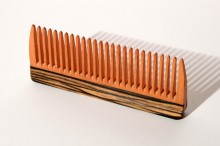 A fellow LumberJock that I follow, Brian Timmons, recently started up a side business selling handmade wooden combs, which are flat out awesome! I saw that he had opened up an Etsy shop, and he actually sold out the first day. His story is a great example of what’s possible when you take the plunge and sell your work. So, I decided to interview Brian to dig even deeper into his story and his side business, Big T Woodworks. In the interview, Brian shares his back story, the motivation to open shop, and some really great tips for new sellers.
A fellow LumberJock that I follow, Brian Timmons, recently started up a side business selling handmade wooden combs, which are flat out awesome! I saw that he had opened up an Etsy shop, and he actually sold out the first day. His story is a great example of what’s possible when you take the plunge and sell your work. So, I decided to interview Brian to dig even deeper into his story and his side business, Big T Woodworks. In the interview, Brian shares his back story, the motivation to open shop, and some really great tips for new sellers.
Enjoy the interview, I hope it provides some motivation to open up shop and some tips to get going. Also, check out the video at the end of the interview where Brian talks a bit about his business and shows some of the processes he uses to build his awesome combs.
How long have you been woodworking?
 “I’ve dabbled here and there all my life, but I got serious about it two and a half years ago. A lot of separate influences led me here. My uncle is a professional woodworker, so whenever I was a kid and we’d visit him in New Mexico he loved to show off his tools to my older brother and I. I remember having my little mind blown by a hollow chisel mortiser. A machine that drills square holes! Clearly anything was possible.
“I’ve dabbled here and there all my life, but I got serious about it two and a half years ago. A lot of separate influences led me here. My uncle is a professional woodworker, so whenever I was a kid and we’d visit him in New Mexico he loved to show off his tools to my older brother and I. I remember having my little mind blown by a hollow chisel mortiser. A machine that drills square holes! Clearly anything was possible.
Growing up around music and playing cello led me to a couple of jobs, first in a general music store. They had pianos, drums, guitars, and whatnot, but my favorite thing about the whole job was getting to watch the string instrument repairman work. He’s a violin and bow maker, and if I didn’t have to deal with customers I could’ve watched him work all day.
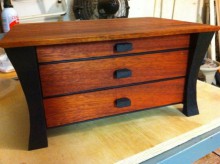 Later I got a sales job in a specialty shop selling violin family instruments, and I also got to help in the shop too. I never went after bona fide luthier training, but I was taught how to varnish and setup instruments, which was really cool.
Later I got a sales job in a specialty shop selling violin family instruments, and I also got to help in the shop too. I never went after bona fide luthier training, but I was taught how to varnish and setup instruments, which was really cool.
Later in life I kept having the urge to do more with wood, and to break new ground beyond what I had already done. Once I got married and bought a house I finally had a garage to work in. My first real project was the jewelry box I made for my wife. It was all downhill from there.”
What made you decide to make combs?
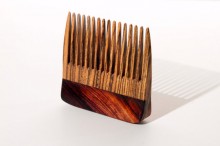 “I wanted to get serious about making some money with my woodworking. Or at the very least, not actually losing money on it. Working from my home on a shoestring budget, I started to think about what criteria I should use for projects to get my business off the ground. Here’s what I decided on.
“I wanted to get serious about making some money with my woodworking. Or at the very least, not actually losing money on it. Working from my home on a shoestring budget, I started to think about what criteria I should use for projects to get my business off the ground. Here’s what I decided on.
Something small and easy to ship. I didn’t want to mess around with packing huge items and all the extra costs associated with that. Also, big items seem more likely to get damaged in shipping.
Items that can made in batches. This way I can repeat my processes once I have a machine set up the way I need it, and I’m not constantly switching between tools and moving my dust collection hose around the garage. Tool switching is time consuming, especially for those of us in small spaces that don’t have enough outlets to leave everything plugged in, or might have to move one tool out of the way in order to use another.
Low cost per item. It seems like a safer bet to make lots of small things that aren’t prohibitively expensive. I’d love to try a Nakashima style table or a Krenov style cabinet made from top shelf woods, but if I can’t find a buyer willing to spend thousands it doesn’t do me much good.
So with all that in mind, wooden combs fit the bill. They’re practical, tough, and stylish. And unlike cutting boards, the market isn’t completely and utterly saturated. Sure there are others making them, but mine still manage to stand out.”
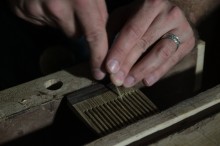 How did you decide to shift from strictly hobbyist to seller?
How did you decide to shift from strictly hobbyist to seller?
“Honestly, a lot behind that decision was borne out of frustration and resentment. I was sick of being broke all the time. I’ve always wanted to make a living with my hands in some way, and I hated that the skills I’m learning weren’t helping me provide for my family. I’m very happy now that I took the plunge, since people are buying my stuff. It’s a very rewarding feeling.”
Do you think you would ever go full time with your woodworking business?
“I do have a day job, but I’m nowhere near the point where I’m ready to fully strike out on my own full time. I’ll just have to see what the future brings.”
Has the decision to sell your work changed anything about your woodworking?
“The nature of making things in quantity has made me more efficient in the shop. But that hasn’t made me a mindless automaton, either. I still enjoy the Zen flow I had with earlier projects. And because I’m more practiced that means less wasted motion, which makes for more enjoyable work.
I’ve heard some folks on forums say that once they turned their woodworking hobby into a business, they immediately lost all enjoyment because suddenly it felt like just another job.
 I can see how that would be the case if you’re doing plain and boxy plywood cabinets all the time, but I certainly don’t feel that way. The validation that comes with people buying my work is awesome. Getting compliments is great, but money does indeed talk. Complete strangers from all over the US, the UK, France, and Germany have bought something I made, and I can’t help but feel good about that.
I can see how that would be the case if you’re doing plain and boxy plywood cabinets all the time, but I certainly don’t feel that way. The validation that comes with people buying my work is awesome. Getting compliments is great, but money does indeed talk. Complete strangers from all over the US, the UK, France, and Germany have bought something I made, and I can’t help but feel good about that.
Selling what I make hasn’t just changed my woodworking, it’s also been a great benefit to my marriage! Before I was selling, my wife usually regarded my woodworking as messy and expensive. She liked what I made just fine and would try to nurture my creative side, but I knew it bothered her that I was dumping money into a hobby and getting nothing out of it. She had her doubts, and I don’t blame her.
Now she’s bought me a ton of beautiful woods to work with, a new band saw, and a lathe! All my hard work is starting to pay off now that I’m putting myself out there. Making sales is great, but it pales in comparison to knowing that my wife really believes in me now. It’s been a huge boost to my confidence and it makes me love her even more.”
Do you have any advice for people who are thinking about starting to sell their work?
“Do your homework, but try not to second guess yourself either. I had a bunch of combs made and I sat on them for months, unsure if anyone would buy a single one. One night I figured, ah what the hell, I’ll just go ahead and sign up on Etsy, see if I get any views. Well, I got more than just a few views. Once I opened, I nearly sold out in less than 24 hours. I was over the moon that day. I couldn’t believe I had waited so long.
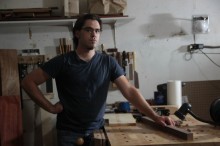 Don’t fall into the trap of thinking that selling your work makes you less of an artist. Somehow we’ve romanticized the archetype of the starving artist, this notion that “selling out” makes your work somehow impure. I can think of numerous cases where that rings true. But also consider Da Vinci, Shakespeare, and Beethoven. They all got paid for their work, and I don’t think anyone would seriously try to argue that they were somehow less of an artist for doing so.
Don’t fall into the trap of thinking that selling your work makes you less of an artist. Somehow we’ve romanticized the archetype of the starving artist, this notion that “selling out” makes your work somehow impure. I can think of numerous cases where that rings true. But also consider Da Vinci, Shakespeare, and Beethoven. They all got paid for their work, and I don’t think anyone would seriously try to argue that they were somehow less of an artist for doing so.
Not to compare myself to the greats or anything, but my point is that it just seems like a silly idea for people get wrapped up in. Don’t be afraid of success.”
Check out Brian’s video that covers more about his business as well as some of the processes he uses to craft his beautiful combs. He’s got a couple really neat processes that he has devised to batch out the processes.
bigtwoodworks.com | Brian Timmons from Seaver Helms on Vimeo.
I just want to give a big Thank You to Brian for taking the time to share his thoughts, story and his insight into starting up his side business. Congratulations on your Grand Opening, and to your continued success with Big T Woodworks!
I hope that the interview with Brian provides a little bit of hope and motivation for the up-and-coming side business entrepreneur out there. There is nothing better than getting your work into the hands of people who not only truly enjoy it, but pay you for your work too! It’s amazing how much feedback you get on your work, how much you learn once you enter the selling world, and how much more gratifying your work in the shop can be when you realize there is demand for what you make.
So, what advice do you have for starting up a side business to sell your work? Any other success stories out there that you would like to share? I’d love to hear about it, leave a comment below.



